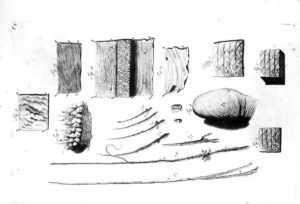You have no items in your cart. Want to get some nice things?
Go shoppingSecond Place in Litro’s Nature Summer Flash Fiction Competition

Once we hit puberty, our moms taught us how to shave and pluck until only the hairs in our noses and head remained. Andrea, my cousin, loved to throw herself into the river, grabbed eels to extract their shocks and then would jolt all of us once she was on land, giggling when our bodies leapt.
She sang to the capybaras when the sun rose and hid chickens from her mother so she wouldn’t serve them for dinner. But she forgot to shave, a trail of hair on her arms, barely visible strands dotted with sweat over her small lips. We all warned her. Then Tin-Tin came one night, took her deep into the forest.
He appears naked, his cock as long as an eel, a guitar strapped around his back, and the face of a haggard gnome without a beard, wearing a hat like witches do — but instead of black it’s the shade of terracotta clay. He’s solely in search of women with wild hair on their bodies. I was fifteen when Andrea disappeared. The day after she left I took her old sloth claws to make into a necklace that would live by my heart. Years ago she found a baby sloth, sick and abandoned by its mother, and tried to nourish it with tapir milk. For a week it drifted in and out of sleep, its eyes closing and opening faster than it could move its arms, until the chest contracted and couldn’t blossom out. She buried it, but not before taking a keepsake. She didn’t talk about it, but she’d give me sloth claw face massages when it rained so much the drips hurt our skin, using the outer crescent on my cheeks, the smooth leading me to a tingly sleep.
I stopped shaving but told no one. Slept in the day, and stayed up at night in the corner of my hut. I pretended to be asleep, clogged my ears with leaves to avoid the guitar’s lull. First came the smell of mangrove. A miasma of rotten eggs that had sizzled under the sun. The faint odor of crabs that live deep in the muck. When it touched me, its skin like the grease of pink boto dolphins, I grabbed the razor I’d shaved with since I was nine, cut its jugular. The next morning I didn’t let the people in the pueblo burn it. I placed the body on the branch of a tree in the outskirts of our village, the flaccid rope that was once a cock next to it, the guitar in pieces.
As the weeks and months went by, on the days the sunset traversed from pink to the red of heliconias, I’d walk by the river to wait for her, clutching the sloth’s keratin to my chest. Hoping she’d rise from the water or appear from the east like an arboreal fog with a baby straddled on her breast. But she never came. I haven’t shaved since I last saw her. Most girls still do. I don’t blame them. Some of the women are convinced he couldn’t have been the only one. And we all know it’s easier to control skin than risk letting a body do what it was born to do.

About Victoria Buitron
Victoria Buitron is a writer and translator who hails from Ecuador and resides in Connecticut. She received an MFA in Creative Writing from Fairfield University. Her debut memoir-in-essays, A Body Across Two Hemispheres, is the 2021 Fairfield Book Prize winner and will be available in Spring 2022 by Woodhall Press.




